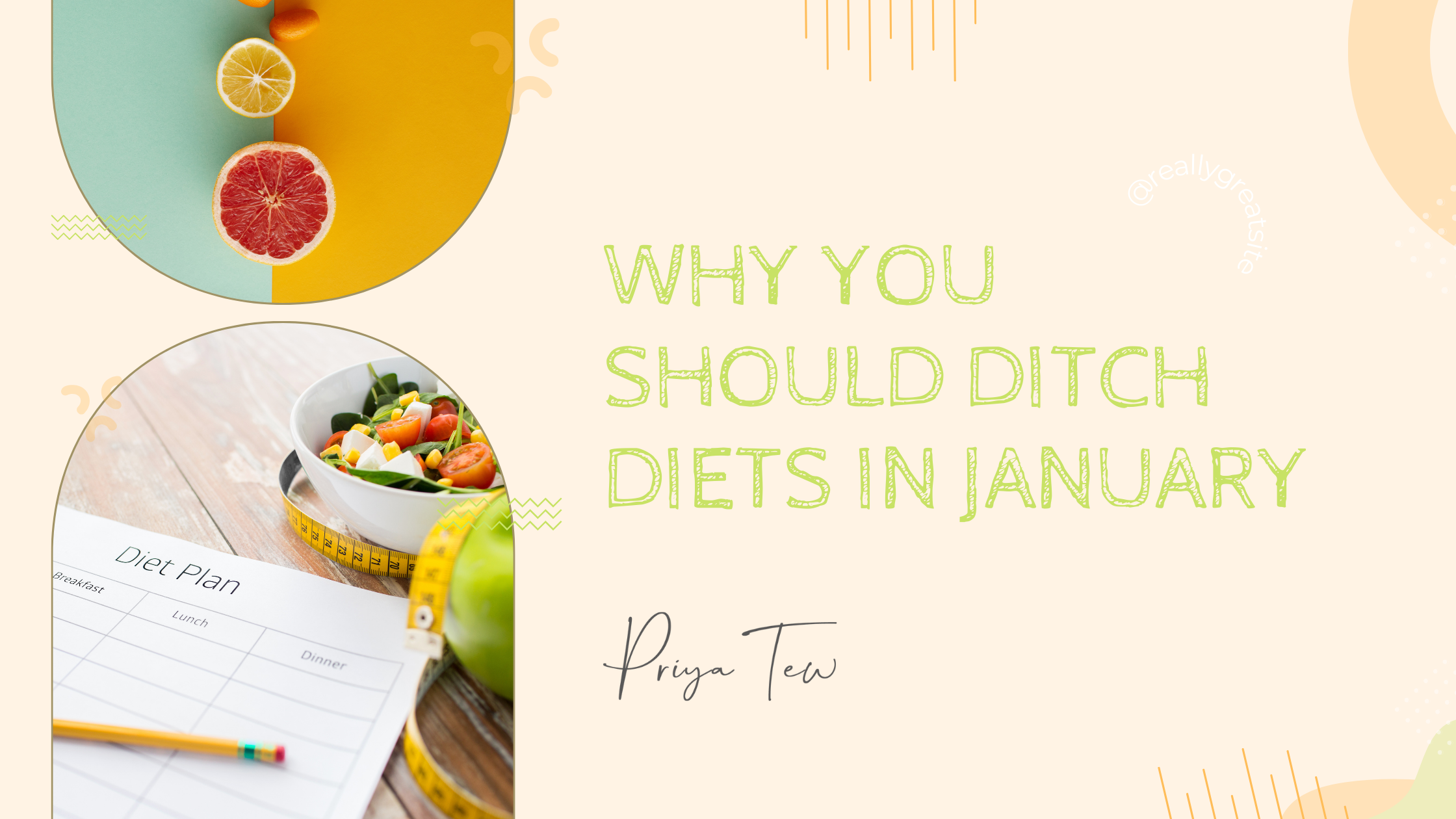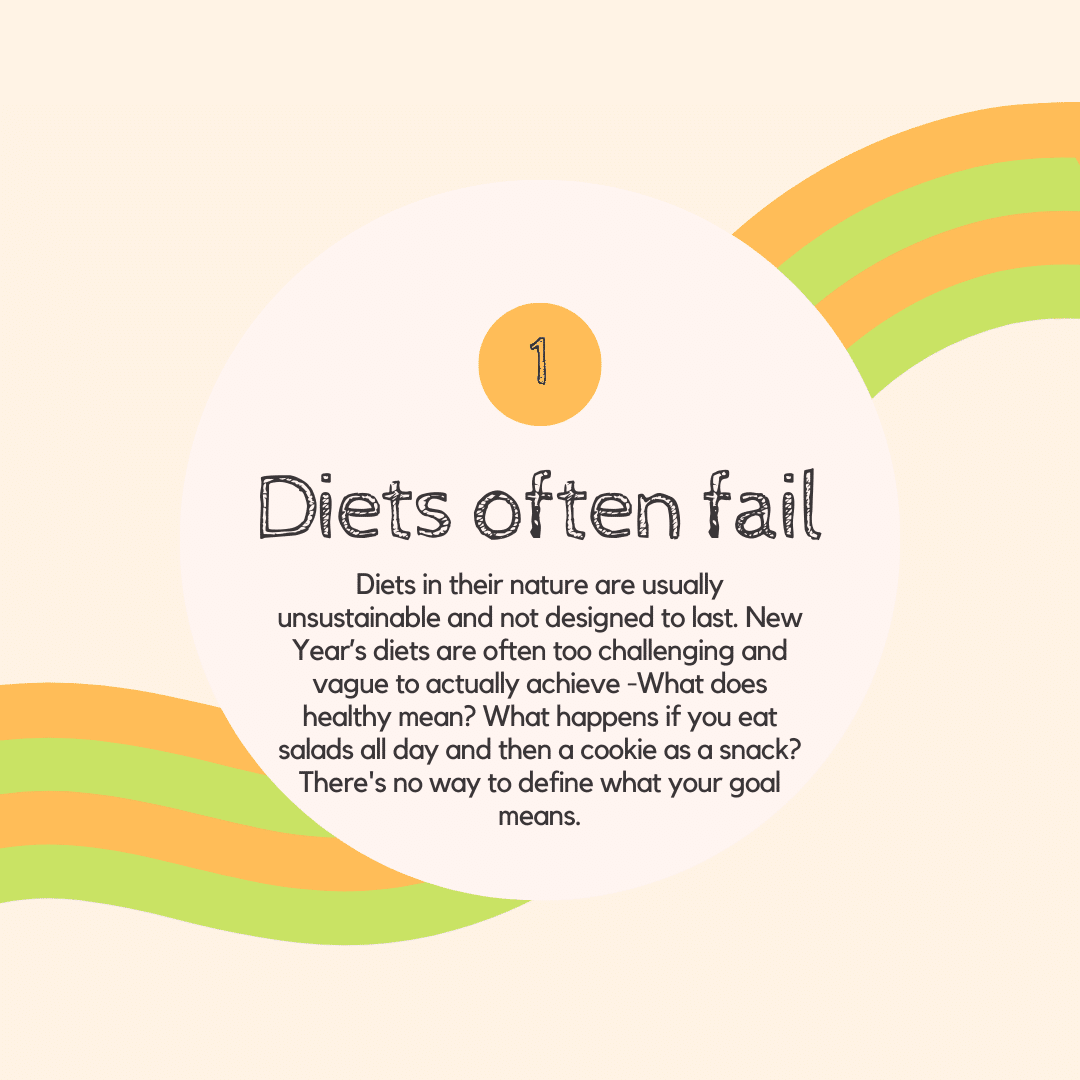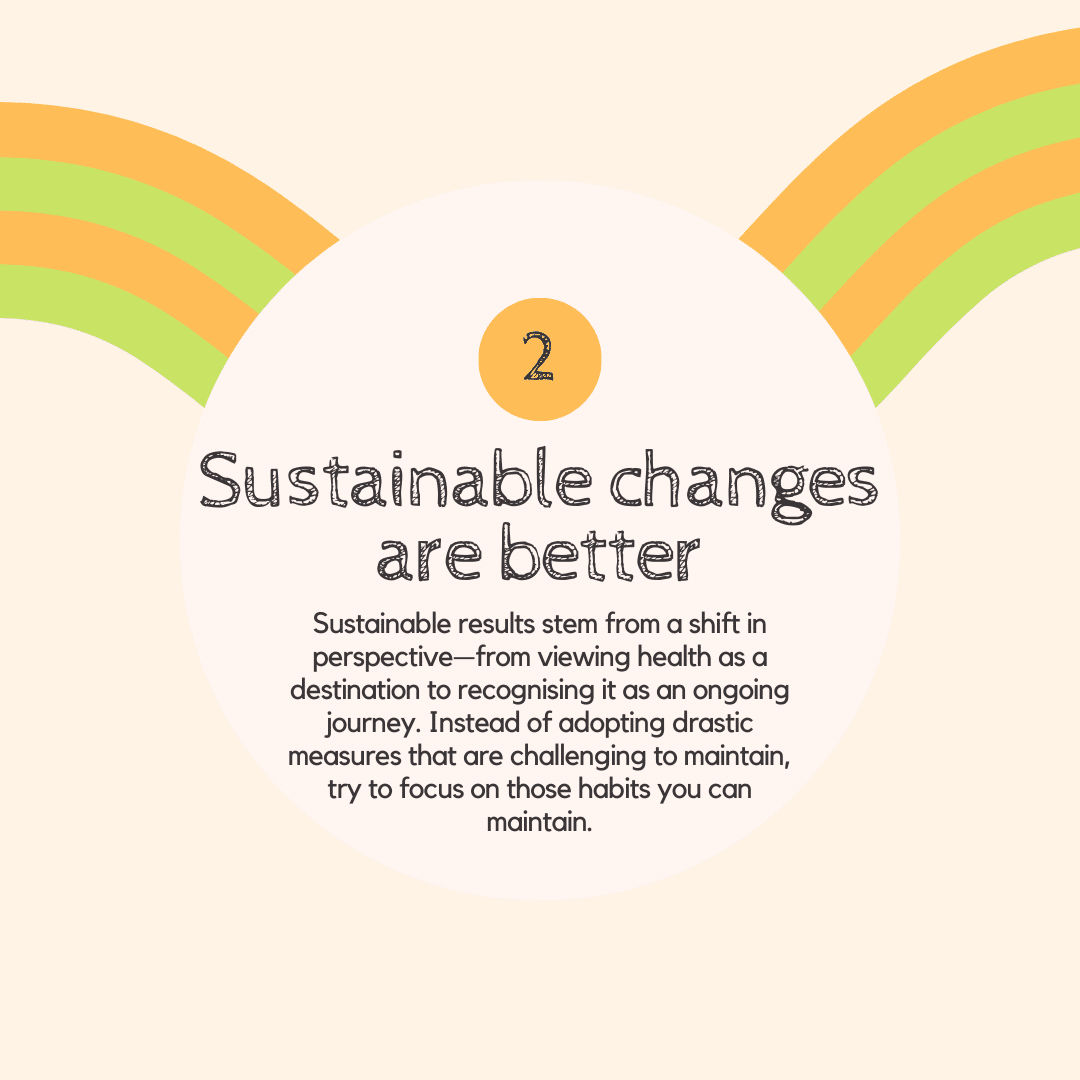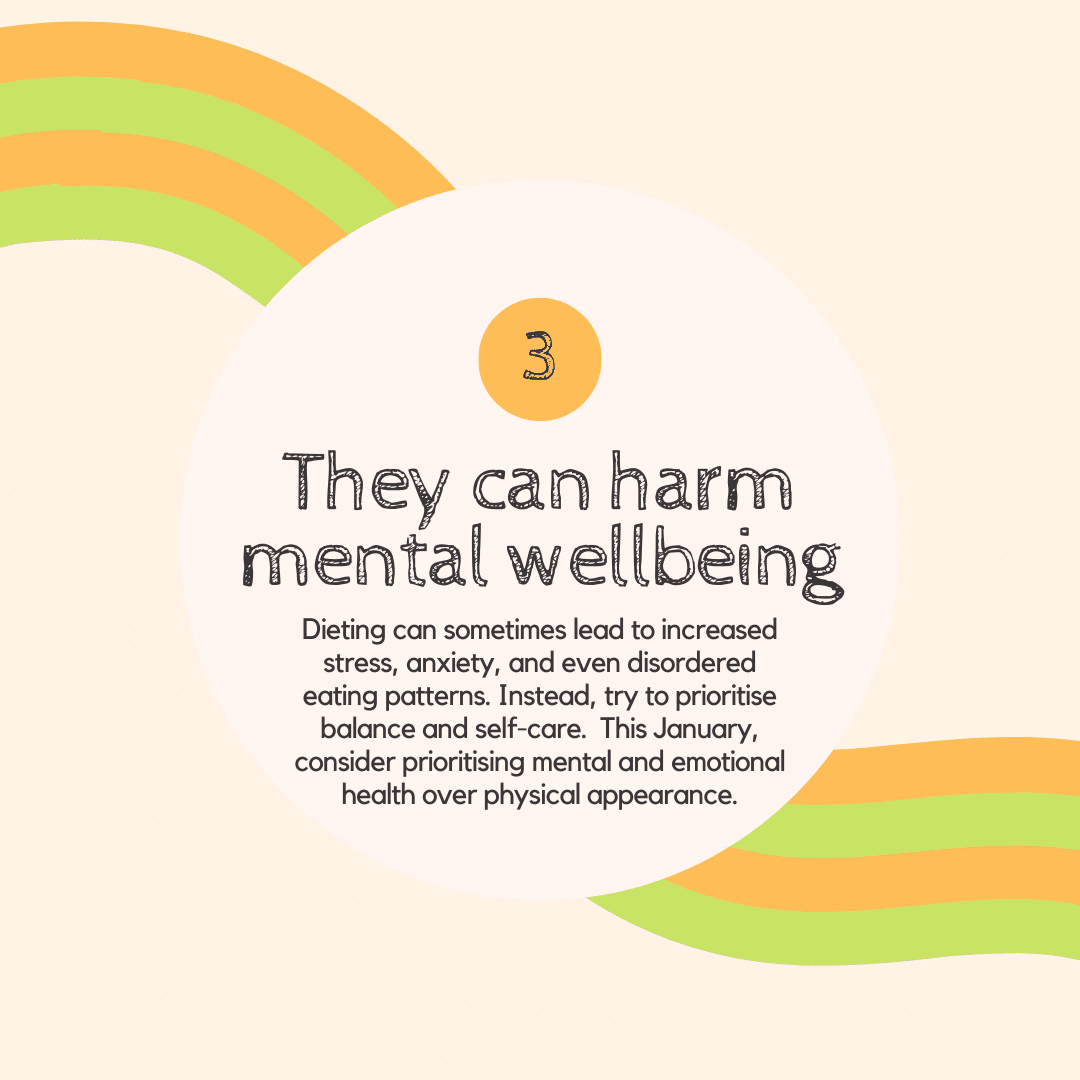
Why you shouldn’t start a new years diet this January: The New Year often feels like a time for fresh start, and this can come hand-in-hand with a new diet or fitness regime. Although well-intentioned, these goals can be unrealistic and driven by external influences or be appearance-led.
So, this year, I dare you to challenge the status quo and reconsider the New Years diet bandwagon. Instead of quick-fix diets, let’s explore why a more sustainable approach may be the key to lasting health. In this blog post, we’ll delve into the pitfalls of New Year’s diet resolutions, the importance of breaking free from the cycle, and how prioritising mental and emotional wellbeing can lead to a healthier and happier you in 2024.
Why New Years diets often fail
The enthusiasm that accompanies New Year’s resolutions is often palpable, especially when it comes to dieting and weight loss goals. This can be compounded by a deluge of email newsletters and social media posts. However, statistics show that a significant number of these resolutions fizzle out by February. The allure of quick results and drastic changes can lead to unsustainable approaches that are difficult to maintain in the long run.
A resolution to “eat healthy” has several problems. Firstly, it’s too vague. What does healthy mean? What happens if you eat salads all day and then a cookie as a snack? There’s no way to define what your goal means. Why not break “healthy” down into a specific food or meal type, such as eating fish or fruits and veg. Secondly, there’s no timeframe or portion. Instead try to put a measurement and frequency to your goal, such as “I’ll eat one portion of oily fish twice a week”. And finally, make sure that whatever you pick is actually realistic and achievable! Setting too challenging a goal makes you more likely to slip up and get disappointed.
Instead of setting ourselves up for disappointment, let’s explore why the conventional January diet resolution path is often a flawed one and consider alternatives that prioritize lasting health.
Try ditching New Years diets in January for sustainable results
Breaking free from the cycle of starting and abandoning diets is a can feel scary, but liberating. The pressure of adhering to rigid rules and restrictions can create a negative relationship with food, leading to cycles of guilt and shame.
This year, why not shift your focus from short-term fixes to long-term lifestyle changes. Sustainable diets come from building eating habits that fit in with your individual needs and preferences. Ditching the January diet mentality will allow you to work on a positive relationship with food instead. There’s nothing wrong with capitalising on the January enthusiasm to start fresh, but you don’t need to go all-in on drastic diet changes. Instead, slowly build in small changes. As each new change becomes habit, you can introduce another one, or increase your goals. For example, if you initially aimed to have 4 portions of fruit and veg per day, you could later increase this to 5.
Sustainable results stem from a shift in perspective—from viewing health as a destination to recognising it as an ongoing journey. Instead of adopting drastic measures that are challenging to maintain, try to focus on those habits you can maintain.
By ditching the January diet craze, you can set yourself up for long-term success through gradual, sustainable changes. This shift away from the cyclical nature of dieting allows for a more patient and compassionate approach to health, fostering habits that can be integrated seamlessly into daily life, leading to lasting well-being beyond the confines of a single resolution season.

Why prioritising mental and emotional wellbeing beats those New Years diets.
January is often associated with the pursuit of physical health, but this can come at the cost of mental and emotional health. Moreover, these New Year regimes can be appearance focused. So not only are you not prioritising your wellbeing, but you could be harming yourself by judging your success on how you look.
Dieting can sometimes lead to increased stress, anxiety, and even disordered eating patterns. Instead, try to prioritise balance and self-care. This may involve seeking support from mental health professionals, practicing mindfulness, and fostering a positive relationship with our bodies. Body positivity and neutrality can take time to work on, but are well worth the effort it takes. If you’d like to learn more about how to work on these, get in touch for 1:1 support and tailored advice.
Dieting often places undue emphasis on physical appearance, neglecting the crucial components of mental and emotional wellbeing. The pressure to adhere to strict rules can lead to increased stress, anxiety, and even disordered eating patterns. This January, consider prioritising mental and emotional health over external metrics. Embracing a positive relationship with food, practicing self-compassion, and fostering body positivity contribute to a healthier mindset that goes beyond the numbers on a scale. Ditching the January diet craze means recognising that health involves a balance between physical, mental and emotional health.

Why quick-fix diets aren’t the answer
Quick-fix diets may promise rapid results, but they often fail to deliver sustainable success. Many of these diets are based on restrictive principles that are challenging to maintain over time. We’ve now got good evidence to suggest that dieting is associated with weight gain in the long run. Weight cycling, the experience of losing and gaining weight,
The cycle of weight loss and regain can be disheartening and detrimental to both physical and mental health. This January, let’s focus on seeking long-term success by adopting realistic and sustainable habits. Gradual, positive changes are more likely to lead to lasting improvements in health and well-being.

Self-love over scale numbers
Rather than measuring success solely by scale numbers, work on redefining your criteria for health. Self-love involves appreciating your bodies for what they can do and nourishing them with kindness. Your body deserves respect regardless of what it looks like or how able you are. Rejecting diets in January allows you to shift your focus from external metrics to internal well-being. Embracing self-love means recognising that health is a holistic concept that goes beyond physical appearance.
Final word on diets in January:
Although there is something to be said for utilising the fresh start of the New Year, to set new goals, try to avoid restriction. Not only are unrealistic goals setting you up for failure, but they can also be harmful for your health and wellbeing.
This January, try to reject diet mentality and instead foster a more balanced approach. Seeking long-term success, rooted in self-love and a rejection of diets, is the key to a healthier and happier you in 2024.
Instead you can work on rebuilding your relationship with food and take a step towards food freedom and intuitive eating using my Flexible Eating Course or sign up to work with the Team on a 1-1 basis.